

Best UPSC Online Coaching
Get the UPSC coaching at iQuanta. Crack UPSC prelims and mains and CSAT with top faculty, live classes, and top study material for proven success.
iQuanta’s 24*7 doubt-solving support provides instant answers to student queries.

iQuanta 2024 Record Breaking Results
Cracked their Dream Exam
.jpg)
.jpg)

.jpg)
.jpg)
.jpg)
.jpg)
.jpg)

.jpg)
.jpg)
.jpg)
.jpg)
.jpg)


Content Relevancy


iQuanta Student Feedback


Why iQuanta is Best?
We work very hard on our UPSC Content at iQuanta!
It has been proved that same questions taught in the classes were directly asked from iQuanta UPSC classes.
Read UPSC Aspirant's reviews just after UPSC Exam

7 Step Process to Master a Concept with iQuanta UPSC Course:
GS Module
CSAT Module
Mains Module
iQuanta’s Dual Pedagogy
Unique dual teaching method which makes sure that not only your concepts are clear but you can also apply those concepts in questions
Dashboard Assignments

+3 Steps
Mentor Driven Practice Self Practice Marathon Sessions
The 24x7 instant doubt solving is one of the features that iQuanta is most renowned for. We solve doubts within 15 minutes in the secret groups and within 20 seconds in the live stream classes.
How Fast are we?
8 minutes and 20 seconds

What students say about our lightning fast Doubt Solving!

We don't just believe in conceptual clarity, we are constantly also making sure that you apply the concepts through our application classes, daily practice sessions, UPSC Material, books & mock tests.
Topic Wise Practice questions for UPSC in the form of assignments available on the Student Dashboard
Mentor driven Daily Practice sessions conducted in iQuanta secret groups with solutions
9000+ JEE Level Practice Questions
UPSC Study Materials


iQuanta's UPSC Mocks


Why iQuanta is Best?
We work very hard on our UPSC Content at iQuanta!
It has been proved that same questions taught in the classes were directly asked from iQuanta UPSC classes.
See what our studets say about our courses

Concept Clarity (via 7 Steps)
7 Step Process to Master a Concept with iQuanta UPSC Course:
GS Module
CSAT Module
Mains Module
iQuanta’s Dual Pedagogy
Unique dual teaching method which makes sure that not only your concepts are clear but you can also apply those concepts in questions
Dashboard Assignments

+3 Steps
Mentor Driven Practice Self Practice Marathon Sessions
24*7 Doubt Solving (within 15 mins)
The 24x7 instant doubt solving is one of the features that iQuanta is most renowned for. We solve doubts within 15 minutes in the secret groups and within 20 seconds in the live stream classes.
How Fast are we?
8 minutes and 20 seconds

What students say about our lightning fast Doubt Solving!

Rigorous Practice
We don't just believe in conceptual clarity, we are constantly also making sure that you apply the concepts through our application classes, daily practice sessions,UPSC Material, books & mock tests.
Topic Wise Practice questions for UPSC in the form of assignments available on the Student Dashboard
Mentor driven Daily Practice sessions conducted in iQuanta secret groups with solutions
10000+ (PYQs & Practice questions)
UPSC Study Materials


iQuanta's UPSC Mocks


UPSC Online Course Packages

CSAT 2025 Course
A. Pre-Recorded Videos
Mathematics - 150+ Videos
Reasoning -100+ Videos
Passage Based - 50+ Videos
B. Live Classes
Weekly Live Classes (3/Week)
C. Previous
3 Previous year CSAT papers with detailed solutions (Can be taken as Mock)
D. Features
24*7 Doubt Solving
Basic Math Conceptual Videos for Confidence Boost
CSAT Level Conceptual Videos & Practice Questions
Weekly Live Lectures
Peer to Peer Learning
Mentorship & Motivation

CSAT 2025 Course Pro
A. Pre-Recorded Videos
Mathematics - 200+ Videos
Reasoning - 200+ Videos
Passage Based - 50+ Videos
B. Live Classes
Weekly Live classes (3/Week)
C. Mock Test Series
10 CSAT Full Length Mocks
15 Sectional Mocks (5 per Section)
5 Previous year CSAT papers with detailed solutions (Available as Mocks)
Detailed AI based analysis on all Mocks
D. Features
24*7 Doubt Solving
Basic Math Conceptual Videos for confidence boost
CSAT level Conceptual Videos and Practice Questions
Weekly Live Lectures
Peer to Peer Learning
Mentorship & Motivation
Weekly Assignments

CSAT 2025 Mocks
A. CSAT Mocks
10 CSAT Mocks with detail solution for all Questions
B. Sectional Mocks
15 Sectional Mocks- 5 sectional mocks for all 3 sections with detail solution
C. PYQ
5 Previous year CSAT papers with detail solution
Everything about UPSC 2025

01
What is UPSC Exam?
UPSC exam is a standardised national level entrance exam that is conducted to recruit candidates for various civil service posts. It is considered the most prestigious and competitive exam in India. It consists of 3 rounds: Prelims, Mains, and Interview.
Why UPSC?

- Good reputation & power
- Serve the nation
- Work in diverse location
- Job Security
- Salary & Perks

02
About UPSC Exam
Conducting Body:
Jobs through UPSC
(On a rotational basis)
- IAS
- IPS
- IFoS
- IRTS
- IRS
- ITS
- RPF
- IPoS
- IRAS
- IRPS
- IAS
- IFS
- IRS

04
UPSC Important Dates
| EVENTS | DATES |
| Notification releases for UPSC exam | 22 Jan 2025 |
| UPSC application form window | 22 jan - 21 Feb, 2025 |
| Correction Window | 22 Feb - 28 Feb, 2025 |
| Prelims exam date for UPSC 2025 | 25 May, 2025 |
| Mains exam date for UPSC 2025 | August 2025 |

05
UPSC eligibility criteria
| Nationality | Indian |
| Age Limit | General category: 21-32, OBC: 21 - 35,SC/ST: 21 - 37 , & PwBD: 21 - 42 |
| Education | should have bachelor's degrees from recoginized university or college |
| Number of Attempts | General/EWS - 6 OBC/PwBD - 9 |
| SC/ST - unlimited |
UPSC Strategy by iQuanta
Everything about UPSC Exam
The Union Public Service Commission is a constitutional body that conducts exams for recruiting in several civil service positions like IAS, IPS, and more. The exam is conducted in 3 rounds. The first round is the Prelim, followed by the Mains and the Interview. Around 11-13 lakhs candidates take the UPSC exam every year. It is an MCQ-based exam.
UPSC 2025 eligibility Criteria
There is an age limit of 21 to 32 for the general category, and for OBC, there is 3 years of age relaxation, 5 years for SC/ST, and 10 years for the PwBD category. The Candidate should be Indian and have a bachelor's degree from some recognized university/college. The General/EWS category candidate can make 6 attempts, whereas OBC/PwBD can give 9 attempts, and SC/ST can give infinite attempts.
How to Prepare for UPSC 2025
Preparing for the UPSC exam can be a bit challenging because of its comprehensive syllabus and competition. So, you need to strategize your preparation accordingly. Here are the tips that can help you:
Understand the UPSC Exam Pattern: As the exam consists of three rounds - Prelims (Objective wise), Mains (Descriptive Wise), and Interview so understanding the paper structure and pattern would make your preparation strategy easy.
Syllabus Analysis: The UPSC syllabus is quite vast, so breaking it down into subjects like History, Geography, Polity, Economy, Science, & Technology would make your preparation much more strategic and focused.
Make a Study Plan: Creating a detailed study plan covering daily, weekly, monthly, and yearly targets will make you focused in your preparation.
Correct Study Material: Choosing correct study material is important for preparation. So, taking reference books, NCERT books, specific study material for UPSC, Online resources, Coaching institutes, and current affairs magazines will be beneficial in your preparation.
Daily Current Affairs: Staying updated with daily current affairs through newspapers, magazines, and online resources and making notes is crucial for the preparation.
Previous Paper and Mock Paper: Practice mock tests and previous year question papers regularly to get familiar with the exam pattern, time management, and question trends.
Revision Strategy: Revise regularly to improve what you know. Pay special attention to retaining fact-based information and comprehending conceptual frameworks.
Optional Subject Selection: Select an optional subject according to your interest so that it can be a plus point in your preparation and study it won’t feel too much.
Answer Writing Practice: Practice writing answers daily in a structured way with word limits and time deadlines, which will give you an edge in the main exam.
Remain Motivated and Healthy: UPSC preparation is exhausting, so keep a positive attitude, remain physically active, and take breaks to prevent burnout.
How to take UPSC mocks?
Strategy to Attempt UPSC mocks:
- 1). Get clear with all the concepts.
- 2). Know all the possible solutions for the particular topic/question.
- 3). Attempt questions as much as possible.
Now, get use to solving questions independently does have in-house protocols. You might first need to undergo solutions when you are unable to solve them. And it is okay. But how to cope?
i) Try to figure it out yourselves. Imagine you're able to get it in 1-3 minutes. (Depending on the difficulty/length). It is fine. Imagine it is beyond 4 minutes; it just means you are still slow and need more practice to slow down.
ii) If the method is not operating or stuck in some step, you have to try for 5-10 minutes before you see the solution. If you come up with the solution yourself, you will be glad, as you will remember it for a very long time since effort was made.
iii) If not solvable after taking 5-10 mins, then review the solution and mark where you got stuck. Was it the first one or somewhere in between? Write down that step in your cheat sheet.
Process of taking UPSC mocks
Follow the below steps for taking UPSC mocks
- Take a Mock
- Note down where you got stuck while analyzing
- Practice 30-50 questions on it
- Take a topic-wise test or a sectional
- Note down where you got stuck while analyzing
- Revisit those topics again
- Proceed to the next mock
Expert Tip: Practice problems from some reference books and, most importantly, practice all problems being shared in the UPSC Preparation - iQuanta group or iQuanta Paid group because problems shared in the group are relevant, which prepares you to a large extent for UPSC.
After Syllabus Completion: Go through key concepts from your weak topics and update your cheat sheet regularly. iQuanta UPSC online coaching will have practice sessions on all the topics in the paid group.
Give one Mock every fortnight and devote more time to discussing the mock than you devote to taking it.
Improve your performance after every Mock by figuring out your weaknesses and practicing questions on the topics that you were not able to solve in your mocks. The task after each Mock is to select one topic and make sure you never answer questions incorrectly on the same topic in the subsequent Mock. In this way, you'll be making up for all your mistakes.
We Can Observe Numerous Success Stories that Shared Something in Common During their UPSC Preparation :
1) Just keep on practicing Questions from your study material, and if you're in doubt, ask in the iQuanta UPSC online coaching group. Someone will always be available.
2) Try to note whatever new you know. It will help you a lot and keep practicing. Be consistent this entire time.
iQuanta UPSC course is known for concept development, application, and the art of solving and clarifying doubts, and it is very much result-driven.
Counseling Time: After reading this, if you have any specific query regarding UPSC Preparation or UPSC Courses, you can call our helpline number.
General Studies Strategy
Preparing for India’s most prestigious job positions, IAS, IPS, and more, can be a bit overwhelming. Here is the step-by-step guidance for the UPSC GS exam you must follow:
Understand the GS Syllabus:
The first step is to analyze the syllabus for the preparation of the General Studies and look at the exam pattern. As the subjects that come in the GS exam are history, Geography, Polity, Science & Technology, Economy, Current affair and environment. Then check the high weightage chapters. The number of questions comes from the particular chapter/topic.
Previous Year Question (PYQ):
Analyse the previous year's question paper and check the pattern of the exam, the repeated topic/questions, and the weightage of the topic. Make the study plan for the daily, weekly, monthly, and yearly bases according to the priority and weightage of the topic.
Current Affairs:
Cover the current affairs daily and make a note of the important events, and that way you will also remember things easily, and it will help in the revision. For covering the current affairs, you can use newspapers, online resources, and magazines. And cover both national and international important events.
Study Resources:
To clear the basic concepts of history, Geography, polity, and economy, you can use the NCERT book for classes 6 -12. For strategy and personalized study materials, you can join the iQuanta UPSC online course, where you will get live classes and a mentorship group, where you can ask your doubts. Making notes helps you even more in understanding the topic concepts and remembering them. Plus, it will also help in revision.
Practice Questions:
Your preparation is incomplete if you do not prepare enough questions on the topics. Also, there are 2 exams: prelims and mains. In the prelims exam, you will get an MCQ-based Paper, while in the mains exam, you will get answer-writing questions. So, practice both MCQ and answer writing questions as it will give you the edge in the preparation. In the iQuanta UPSC course, you will get completely planned topic-wise practice questions.
Mock Test:
Giving a mock test once a week will help you analyze your GS preparation. It will also help you analyse in which area/topic you are weak and need to focus more. You can also take iQuanta UPSC GS mock tests, where you will get AI-based analyses. You don’t need to analyze by yourself for hours; AI will do it for you in minutes and generate a report for you, reporting weak and strong areas so that you can utilize analyzing time in studying.
Important Tip:
It is going to be a long journey preparing for General studies. So, preparing yourself mentally and physically is important.
You need to stay motivated as there will be times when you will feel completely exhausted from the preparation, but remember that the UPSC General Studies exam will test all your abilities. So, giving up is not an option for you.
Preparing for General studies for the UPSC CSE exam not only needs hard work but also smart work. So be ready, and you've got this!
CSAT Strategy
The UPSC CSAT (Civil Services Aptitude Test) is the second UPSC Prelims paper, qualifying in nature, and 33% (66 out of 200 marks) is the passing mark. Since most candidates are unable to crack CSAT, especially those who are not from a mathematical background, here's a structured approach to clear it productively.
Understand the CSAT Syllabus:
The CSAT exam consists of three sections: Quantitative Aptitude, where you will get questions related to Mathematics class 10 level; Logical Reasoning & Analytical Ability, where you will get questions related to puzzles, seating arrangements, syllogisms; Reading Comprehension & Decision-Making, where you will get questions related to RC passages, data sufficiency
Analyze your strengths and weaknesses:
Before starting your CSAT preparation, give a mock test so that you can analyze your weak and strong areas and you can make a study plan accordingly. After giving a mock test, you find you are weak in QA and LR, focus more on basic concepts, and if you are weak at RC, then focus more on developing reading speed, grammar, and accuracy.
Preparation Strategy Section-wise:
The UPSC CSAT exam consists of three sections, so you have to plan your strategy accordingly. Here is the strategy you can follow:
Quantitative Aptitude:
Topics you should focus on are percentage, profit & Loss, Ratio & Proportion, work & time, Data Interpretation, Time-speed-Distance, Averages, and Probability.
The strategy you can follow is to cover the basic concepts of topics/chapters and learn the basic formulas and tricks for quick calculation. Solve 20-25 questions daily. And focus more on Data Interpretation as it’s a scoring subject.
Logical Reasoning & Analytical Ability:
For Logical Reasoning and Analytical Ability, you should focus on blood relations, syllogisms, coding-decoding, direction sense, seating arrangement, Input-output, statement-assumption, and cause-effect.
Reading Comprehension & Decision-Making:
In this section, you should focus on RC Passages, Data Sufficiency, and Ethical & Governance-Based Decision-Making.
The strategy you should opt for is practice daily 2-3 RCs, Underline keywords after reading, for decision making choose logical and ethical answers and there is no negative marking in decision making.
Time Management & Mock Practice
- At least 10-15 complete CSAT mock tests must be attempted before Prelims.
- Old-year CSAT question papers (2013-2023) must be practiced for solving.
- Quality is better than speed (getting 45-50 right questions will do).
Exam Day Strategy:
- Begin with the section with which you are most comfortable and confident.
- Do not waste time on lengthy, drawn-out questions; go back to them if there is enough time.
- Obtain a minimum of 66 marks (steer clear of attempts in negative-marking sections).
Last Tips:
CSAT is qualifying but not simple—do not take it lightly. If Maths/Reasoning is weak, prepare early & practice daily. With a correct strategy and mocks at regular intervals, clearing the CSAT will be a cakewalk.
Mains strategy
The civil service exams for prestigious Jobs in India, such as IPS, IAS, etc, are conducted by UPSC. Candidates should clear the 3 rounds to get the prestigious positions in India: prelims, mains, and interview. Here, we will discuss the main strategy:
Understand the exam Structure:
The UPSC mains exam consists of 9 papers:
For the qualifying paper, candidates need to score a minimum of 25% to pass the exam. There are 2 papers in the qualifying paper. Paper A is a compulsory Indian Language exam consisting of 300 marks. Paper B is an English language exam consisting of 300 marks
In the Merit-Based Paper, there is an essay of 250 marks. General studies (GS 1-4) of 1000 marks. Optional subject (2 papers) of 500 marks.
The total marks of the UPSC mains exam is 1750 marks and Interview is 275 that make the total of 2025 marks.
GS Paper Strategy:
GS Paper 1
History, Geography & Society
History: Focus on Modern India (Spectrum), World History, and Art & Culture (Nitin Singhania). Answer writing is most important!
Geography: Read NCERTs + GC Leong. Utilize maps to make answers better.
Society: Utilize current affairs + case studies from Yojana, PIB, and The Hindu.
Answer Writing: Utilize a structured format- Introduction, Body, Conclusion.
GS Paper 2
Polity, Governance & IR
Polity: Study Laxmikanth, relate static concepts to contemporary issues.
Governance: Apply ARC reports and ongoing government schemes.
International Relations (IR): Study MEA website, Rajiv Sikri, concentrate on India's bilateral & multilateral relationships.
Writing Tip: Incorporate Supreme Court judgments, committee reports, and articles of the Constitution.
GS Paper 3
Economy, Science & Tech, Environment, Security
Economy: Study NCERT + Economic Survey + Budget. Familiarize yourself with terms such as fiscal deficit, inflation, etc.
Science & Tech: Cover new technologies (AI, Blockchain, Space Tech, etc.).
Environment: A Study from Shankar IAS covers climate change issues.
Security: Read internal security problems from 2nd ARC report, Naxalism, cyber attacks.
Writing Tip:Use flowcharts, data points from Economic Survey, PIB.
GS Paper 4
Ethics, Integrity & Aptitude
Theory: Read Lexicon or any standard book.
Case Studies: Practice writing structured answers using ethical models (Utilitarianism, Deontology, etc.).
Examples: Give real-life examples of ethical leaders and bureaucrats.
Writing Tip: Always provide balanced answers with a practical approach.
Writing Strategy for Essay:
The Structure you need to follow for essay writing is:
Introduction: You can start with the quote or with an overview of the essay in a paragraph.
Body: You can elaborate on different perspectives in this section.
Conclusion: You can summarize the essay in this particular section.
There will be 2 sections in essay writing: one is philosophy and another one is general. For the resources, you can read topper’s essay and iQuanta’s UPSC study material. You need to practice one essay daily and get feedback for better improvement.
Strategy for Optional Subject:
Select a subject that aligns with your interest and can increase your score. Use diagrams and flowcharts to explain your point of view clearly. Practice answer writing and revise standard books.
Current Affairs Strategy:
Read The Hindu, Indian Express, PIB, Yojana, and the Economic Survey daily and also take a look from magazine and online resources and stay updated daily and make notes of important events daily, As it will help you in revision. Stay updated on both national and international news.
Time Management
The first 3 months focus on covering the static syllabus & basic answer writing. For the next 3 months, cover the Intensive revision and give a full-length test series. In the final month, completely focus on revision, essay writing, and current affairs consolidation.
Mindset & Consistency
As you are preparing for India’s most prestigious and competitive exam, there will be times when you get burned out in the preparation because of the vast syllabus. To avoid that, take small breaks, do meditation, or take a 15-minute nap in between.
There will be times when you feel like procrastinating the task according to the study plan you have made, but you need to stay disciplined and follow the study plan.
Most importantly, keep revising the things you studied the previous day because UPSC is all about retention and recall.
Final Tip:
You got this. Believe in yourself!


Help us building Largest UPSC Communities
Join Now
Join Now
Join Now
Join Now
Join Now
Book 1 on 1 Counselling from UPSC Experts
iQuanta Features
Listening passively has certain disadvantages because one is not actively involved in the learning process. And as we have limited attention spans, any student will not be able to listen attentively for an extended period of time.
Hence short attention spans can be increased through iQuanta’s Dual pedagogy in the UPSC online classes wherein the focus is not only on teaching theoretical concepts but also application-based learning.



Content Relevancy is one of the biggest features of iQuanta's best UPSC coaching. Over the years it has been observed several times that the questions in exams like CAT, XAT and IIFT were similar to what was taught in the class.

A community is very important as having a dedicated community in one place will provide you with the necessary support for your UPSC coaching.

Listening passively has certain disadvantages because one is not actively involved in the learning process. And as we have limited attention spans, any student will not be able to listen attentively for an extended period of time.
Hence short attention spans can be increased through iQuanta’s Dual pedagogy in the UPSC online classes wherein the focus is not only on teaching theoretical concepts but also application-based learning.



Content Relevancy is one of the biggest features of Content Relevancy is one of the biggest features of iQuanta's best UPSC coaching. Over the years it has been observed several times that the questions in exams like CAT, XAT and IIFT were similar to what was taught in the class.

A community is very important as having a dedicated community in one place will provide you with the necessary support for your UPSC coaching.


























































































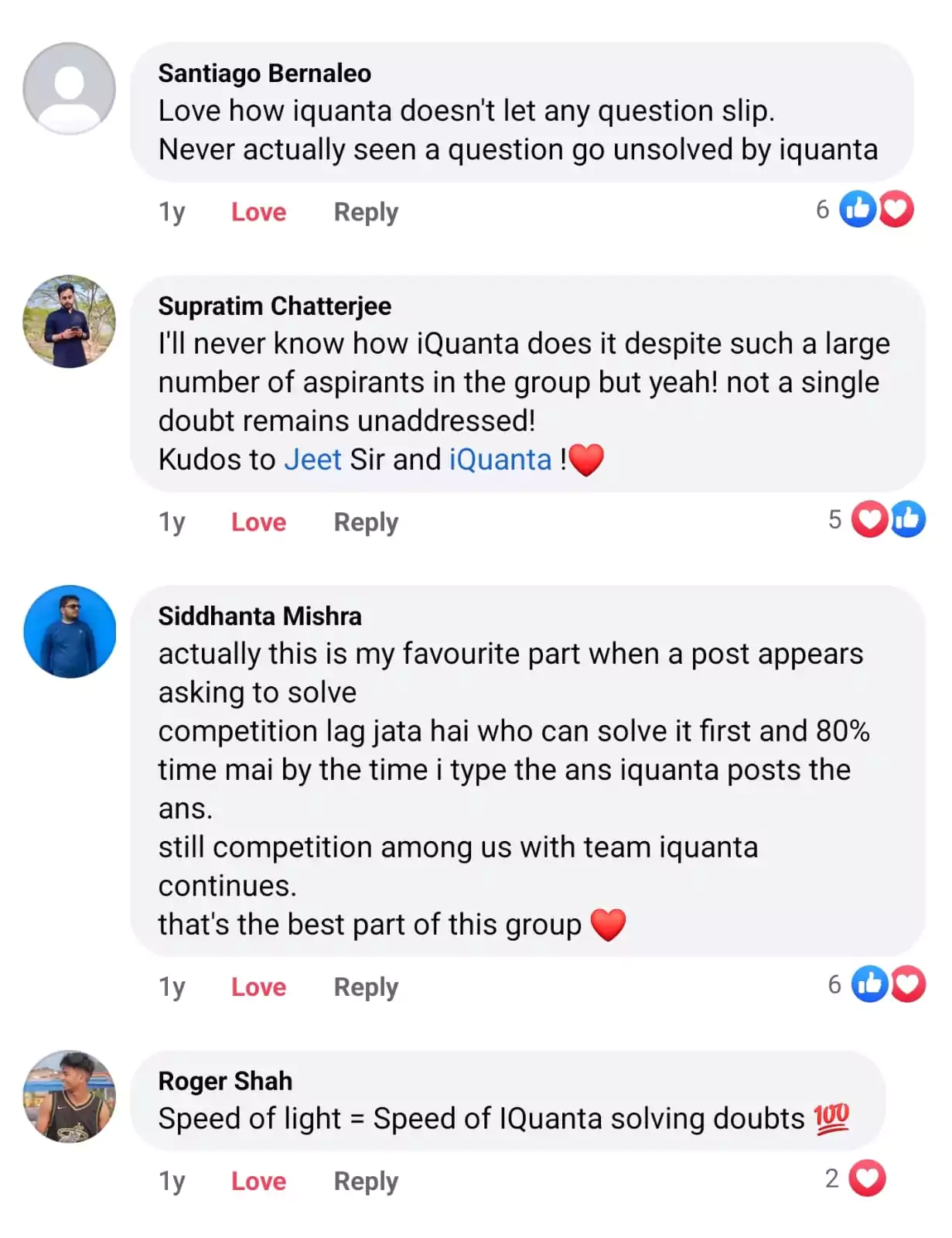
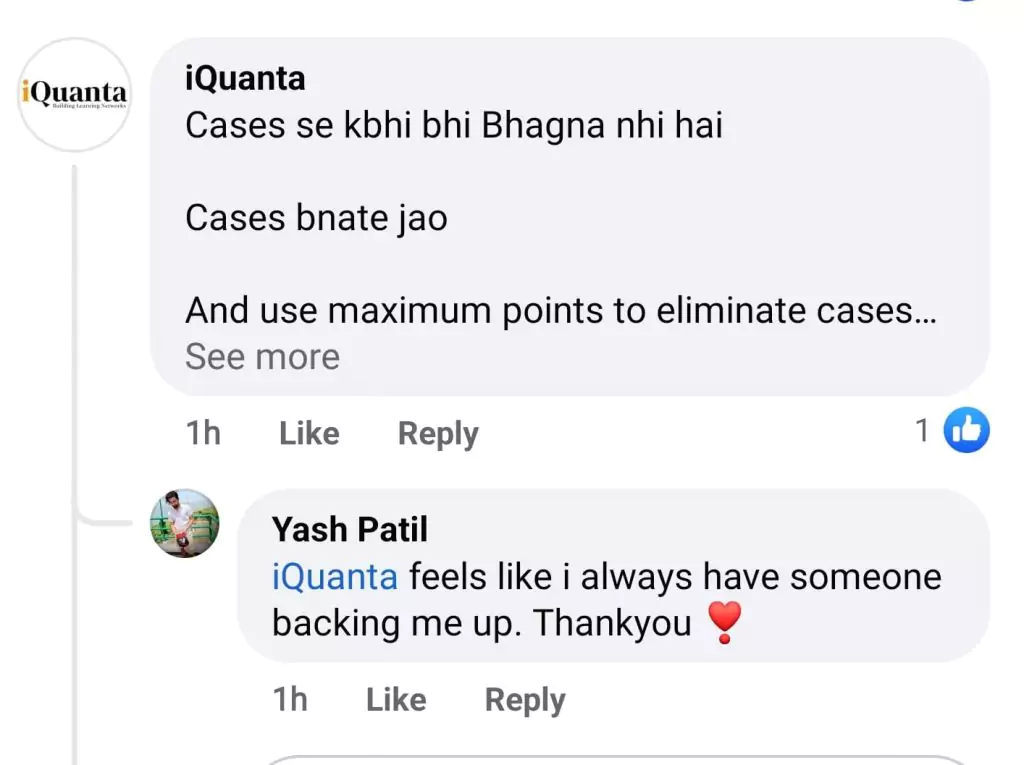
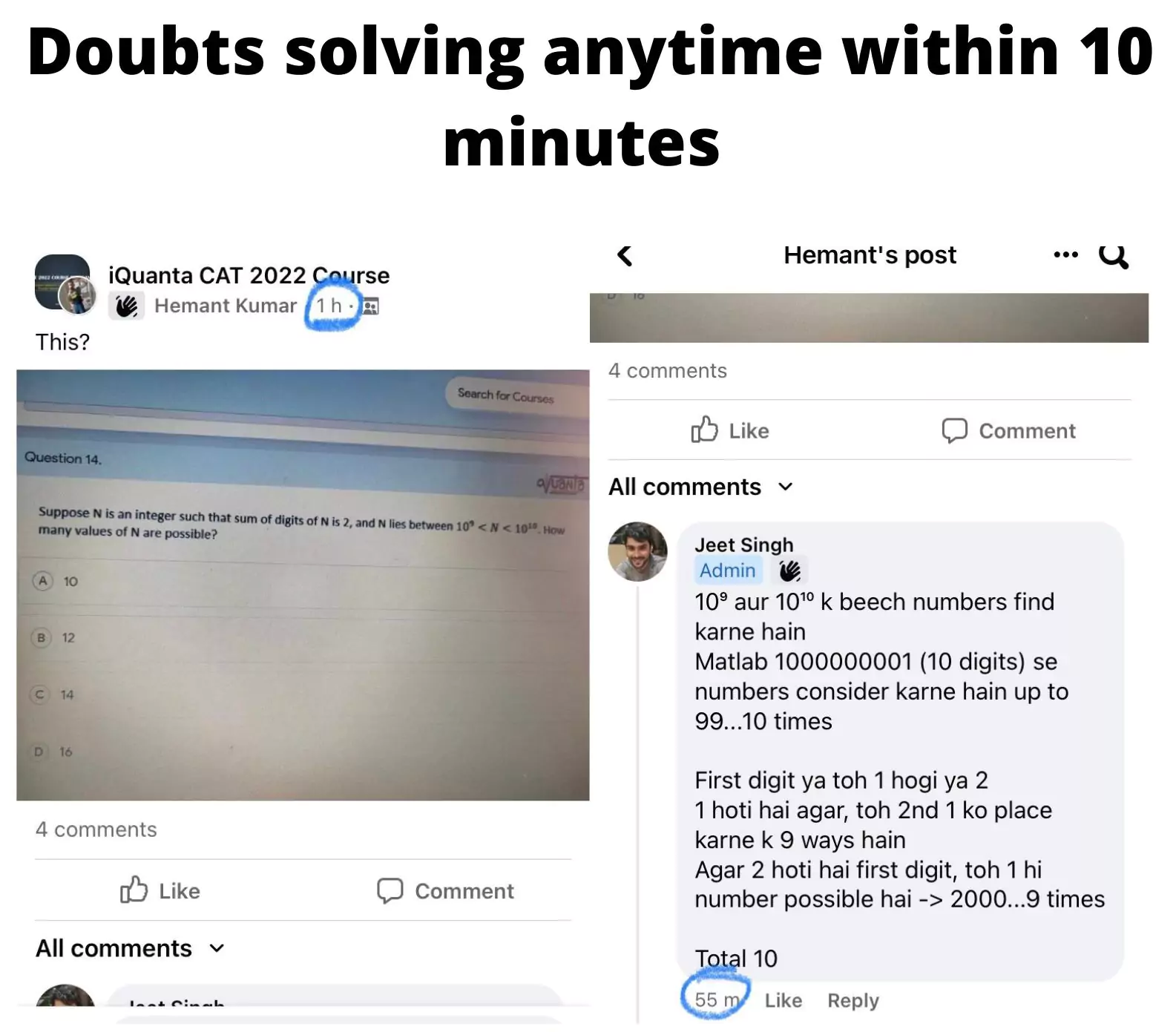

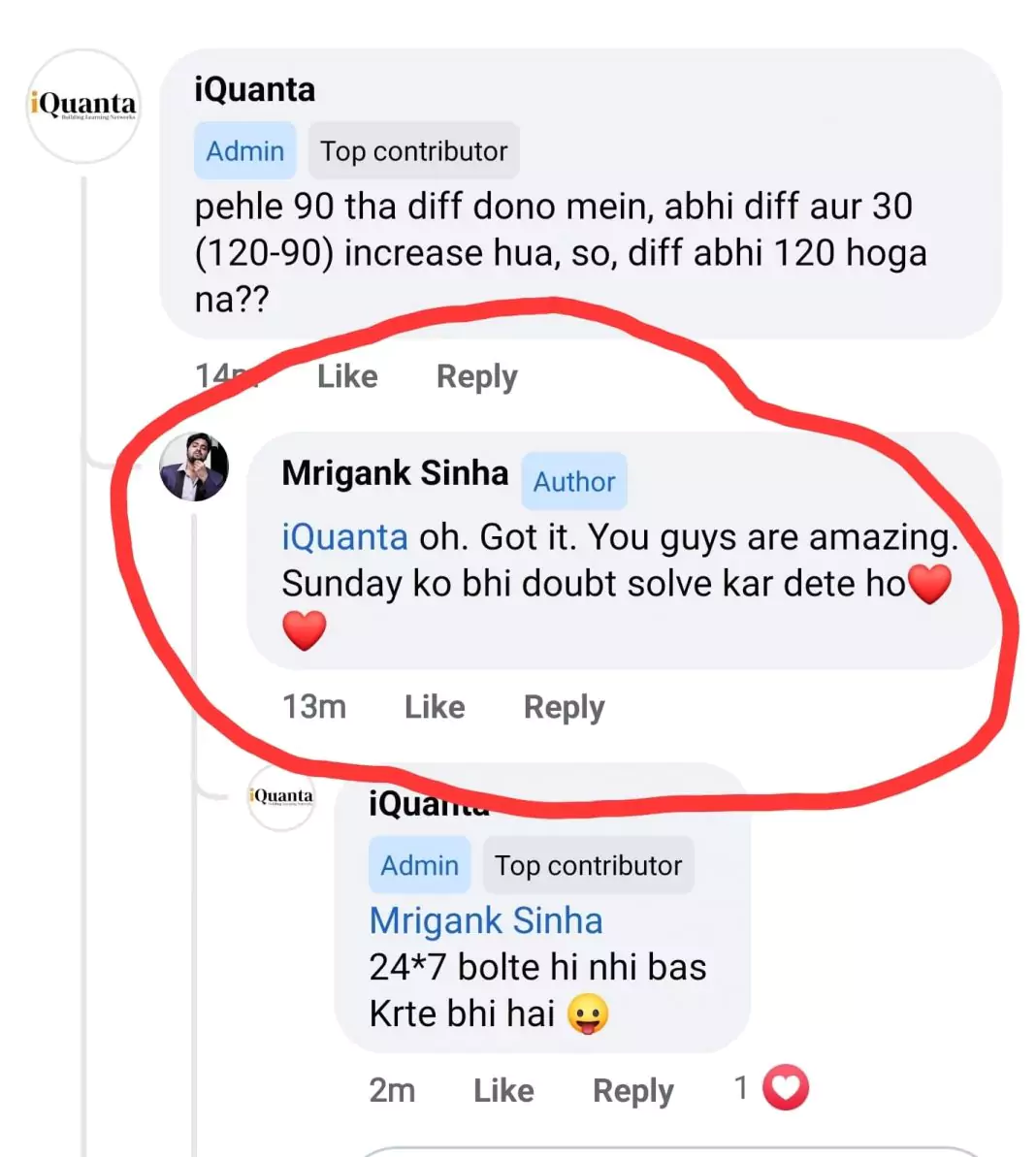

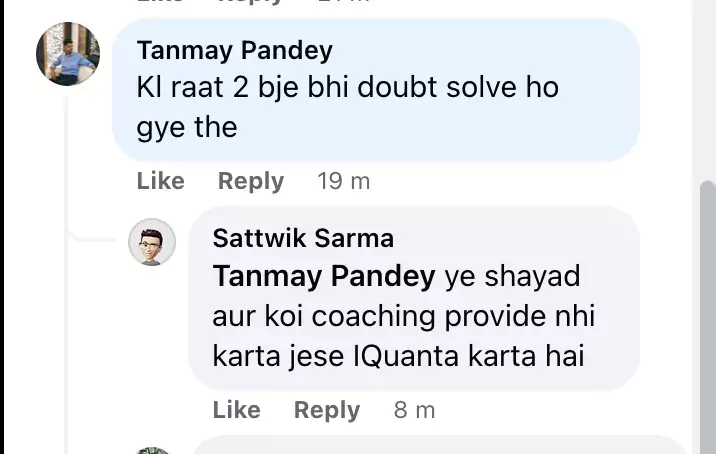

 Indian History - 1000+ Questions
Indian History - 1000+ Questions 

